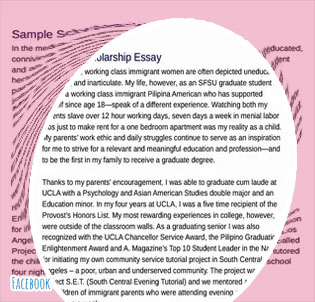- Home
- Order
- Price
- Samples

Best way to write a scholarship essay

Writing a scholarship essay can be a daunting task, as it requires you to effectively communicate your achievements, goals, and aspirations in a concise and compelling manner. To help you craft a winning scholarship essay, we have curated a list of 3 articles that offer valuable tips and insights on how to write an impressive essay that stands out to scholarship committees.
10 Tips for Writing a Winning Scholarship Essay
Scholarship essays are a crucial part of the application process for many students around the world. These essays provide an opportunity for students to showcase their accomplishments, aspirations, and personality to scholarship committees. However, writing a winning scholarship essay can be a daunting task. To help you succeed in this endeavor, here are some expert tips to guide you through the process.
First and foremost, it is essential to carefully read and understand the essay prompt. Make sure you address all aspects of the prompt in your essay to demonstrate that you have a clear understanding of what is being asked of you. Additionally, it is important to personalize your essay by sharing personal experiences and anecdotes that highlight your unique qualities and strengths.
Another key tip is to be concise and to the point. Scholarship committees review numerous essays, so it is important to make your essay stand out by being clear, concise, and engaging. Additionally, be sure to proofread your essay multiple times to ensure it is free of grammatical errors and typos.
In conclusion, writing a winning scholarship essay requires careful planning, attention to detail, and a personal touch. By following these expert tips, you can increase your chances of crafting a compelling essay that effectively communicates your qualifications and aspirations to scholarship committees.
How to Structure Your Scholarship Essay for Maximum Impact
Crafting a compelling scholarship essay is essential for standing out among a sea of applicants. To maximize the impact of your essay, it is crucial to structure it effectively.
Begin by clearly outlining your goals, aspirations, and experiences that have shaped your academic journey. This will provide the reader with a clear understanding of who you are and what drives you. Next, make sure to connect your personal story to the specific scholarship you are applying for. Tailoring your essay to the values and mission of the scholarship organization will demonstrate your genuine interest and commitment.
In addition, use concrete examples and vivid details to bring your story to life. Show, don't tell. This will make your essay more engaging and memorable. Furthermore, be sure to proofread your essay carefully to ensure it is free of grammatical errors and typos.
One practical use case of structuring a scholarship essay for maximum impact is a student who applied for a prestigious scholarship to study abroad. By carefully structuring her essay to highlight her passion for cross-cultural exchange and her previous experiences volunteering in diverse communities, she was able to impress the selection committee. As a result, she was awarded the scholarship, enabling her to pursue her dream of studying in a foreign country and gaining valuable international experience.
The Dos and Don'ts of Scholarship Essay Writing
Scholarship essays play a crucial role in securing financial aid for students around the world. Crafting a compelling and well-written essay is essential for standing out among the competition. To help you navigate this process, here are some dos and don'ts to keep in mind.
Do:
- Research the scholarship organization and tailor your essay to fit their mission and values.
- Start early and give yourself plenty of time to brainstorm, write, and revise your essay.
- Show, don't tell. Use specific examples and anecdotes to demonstrate your qualities and achievements.
- Proofread carefully to ensure your essay is free of errors and typos.
- Seek feedback from teachers, counselors, or mentors to get valuable insights and suggestions.
Don't:
- Write a generic essay that could be used for multiple scholarship applications.
- Plagiarize or use someone else's work as your own.
- Focus solely on your achievements without reflecting on your personal growth and aspirations.
- Use clichés or overly formal language that doesn't reflect your true voice.
- Wait until the last minute to start working on your essay.
In conclusion, writing a successful scholarship essay requires careful planning, research, and attention to detail. By following these dos and don't
- Personal reflection essay
- Essay hook examples
- Personal essay for scholarship
- Good introductions for argumentative essays
- Compare and contrast essay example
- Good ways to start an essay
- Descriptive essay about your favorite place
- Examples of thesis statements for argumentative essays
- Analytical essay
- Personal statement essay examples
- Narrative descriptive essay example
- Essay editor
- 1000 word essay
- Coursework writing service
- Leadership essay
- Website that pays you to write
- Best essay writing service
- Example of expository essay outline
- Write my philosophy essay
- Process analysis essay
- Write an argumentative essay
- Body of an essay
- Descriptive essay about technology
- Reflective essay introduction example
- Write my paper
- 500 word essay
- Help with writing a paper
- Essay writing websites
- Buy essay
- Chegg essay
- Essay about using mobile phone
- Personal essay
- Writing a history essay
- Rhetorical analysis essay
- Writing a essay
- Write research paper service
- Good hooks for research essays
- Essay about volunteer work
- Writing a scholarship essay
- Mit essays
- Descriptive essay example about a place
- Introduction for persuasive essay
- Critique essay
- Essays for sale
- Persuasive essay topics
- Free compare and contrast essay examples
- A essay example
- Interesting topics for persuasive essays
- Expository essay
- How to make an essay longer
- Essay writer
- Are apa papers double spaced
- Format of essay writing
- A persuasive essay
